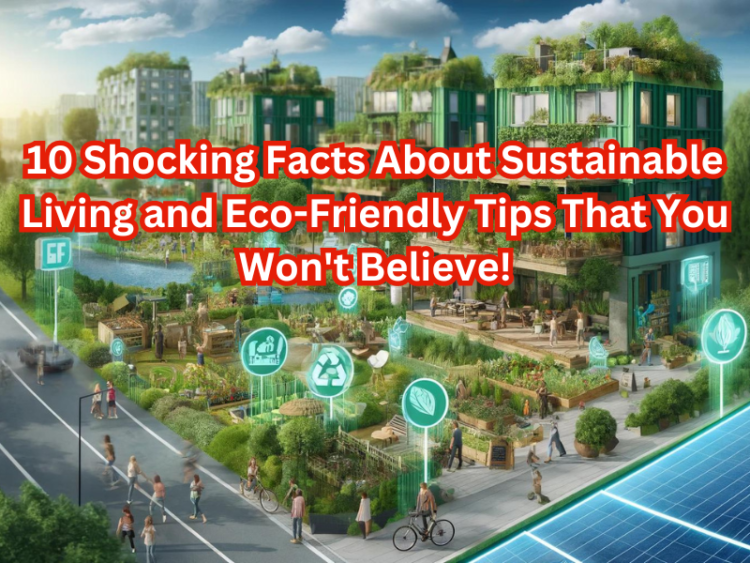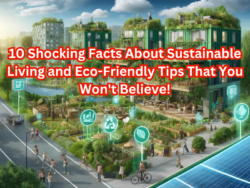10 Shocking Facts About Sustainable Living and Eco-Friendly Tips That You Won’t Believe!

Sustainable living is more than just a trend—it’s a necessity. But how much do you really know about living green? From surprising ways to reduce your carbon footprint to the hidden benefits of eco-friendly habits, these 10 shocking facts about sustainable living will make you rethink everything!
Sustainable living is not just a trend—it’s a necessity for our planet’s future. But how much do you really know about living green? From surprising ways to reduce your carbon footprint to the hidden benefits of eco-friendly habits, these 10 shocking facts about sustainable living will make you rethink everything you thought you knew about going green!
1. Your Fashion Choices Are More Harmful Than You Think
The fashion industry is a significant contributor to environmental degradation, accounting for approximately 10% of global carbon emissions and nearly 20% of wastewater. Fast fashion promotes a throwaway culture, leading to millions of tons of clothing waste in landfills each year. By choosing sustainable fashion brands, buying secondhand, or simply wearing what you already own, you can drastically reduce your environmental impact. Who knew your wardrobe could have such a large ecological footprint?
2. Going Vegan Can Cut Your Carbon Footprint in Half
Think driving an electric car is the best way to reduce your carbon footprint? Think again! Adopting a vegan diet can slash your carbon footprint by up to 50%. The production of meat and dairy is a major source of greenhouse gas emissions, requiring vast amounts of water and land. Embracing plant-based eating is a powerful way to reduce your environmental impact—one meal at a time.
3. Your Old Electronics Are a Goldmine—Literally
E-waste is a growing problem, with millions of tons of electronics discarded every year. What many don’t realize is that old gadgets contain valuable materials like gold, silver, and copper. Instead of throwing them away, recycle your electronics to recover these precious metals and reduce the need for mining new resources. Plus, recycling e-waste helps prevent toxic materials from contaminating the environment.
4. Composting Could Save the World—Or At Least the Soil
Did you know that up to 40% of food produced globally is wasted? This not only wastes resources but also contributes to methane emissions when food ends up in landfills. Composting is a simple yet powerful solution. By turning food scraps into nutrient-rich compost, you can enrich the soil, reduce the need for chemical fertilizers, and lower your carbon footprint. It’s like giving back to the Earth with every banana peel!
5. The Hidden Danger of Conventional Cleaning Products
Your household cleaners might be doing more harm than good. Many conventional cleaning products contain harmful chemicals that can negatively impact your health and the environment. These chemicals can pollute waterways and harm aquatic life when washed down the drain. Switching to eco-friendly, non-toxic cleaning products is safer for both your home and the planet. You’ll be amazed at how easy it is to clean green!
6. Air-Drying Your Clothes Could Save a Ton of Energy
It’s a simple habit, but it packs a punch: air-drying your clothes can significantly reduce your household’s carbon footprint. Clothes dryers are one of the most energy-intensive appliances. By hanging your laundry to dry, you save energy, lower your electricity bill, and extend the life of your clothes. Who knew something so old-fashioned could be so eco-friendly?
7. Single-Use Plastics Are Choking Our Oceans—But You Can Help Stop It
Every minute, the equivalent of a garbage truck full of plastic is dumped into the ocean. Single-use plastics are one of the biggest threats to marine life, affecting millions of animals every year. But there’s good news: by simply refusing single-use plastics—like straws, bags, and bottles—you can make a significant difference. Opt for reusable alternatives, and encourage others to do the same. Small changes add up!
8. Green Energy Is More Affordable Than Ever
Switching to renewable energy isn’t just good for the planet—it’s also good for your wallet. The cost of solar panels and wind energy has dropped dramatically in recent years, making green energy more accessible than ever before. Many households find that investing in renewable energy pays off in the long run, with lower utility bills and increased home value. Going green has never been so financially smart!
9. Your Lawn Is an Ecological Dead Zone—Consider Rewilding
Lawns are a staple of suburban living, but did you know they’re basically ecological dead zones? Lawns require excessive water, fertilizers, and pesticides, all of which can be harmful to the environment. Consider rewilding your yard by planting native species, creating a garden, or letting part of your lawn grow wild. This not only supports local wildlife but also reduces water usage and helps restore natural ecosystems.
10. The Tiny House Movement Is More Than Just a Trend
Tiny houses aren’t just for minimalists—they’re a powerful tool for sustainable living. By reducing your living space, you lower your energy consumption, waste production, and overall carbon footprint. Plus, tiny houses often use recycled or sustainable materials, making them an eco-friendly alternative to traditional housing. It’s a big step toward a smaller, greener lifestyle!
Conclusion
Sustainable living is full of surprises, from the hidden impact of our daily habits to the amazing benefits of going green. Whether you’re just starting your eco-friendly journey or are a seasoned sustainability pro, these shocking facts show that there’s always more to learn—and more ways to make a positive impact.
Ready to make a change? Share this article with friends and start a conversation about the future of our planet. Every small step counts!





